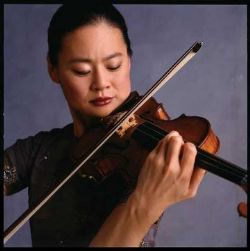|
Symphony
FROM THE NEW WORLD TO THE OLD WORLD
by Peter Lert
Saturday, June 14, 2025
Chamber
MC2 DUO RECITAL CLOSES 222'S SEASON
by Terry McNeill
Saturday, June 14, 2025
Choral and Vocal
CANTIAMO SONOMA'S LUSCIOUS A CAPELLA SINGING IN SEASON ENDING CONCERT
by Pamela Hicks Gailey
Sunday, June 8, 2025
Symphony
SRS SEASON ENDS WITH RESOUNDING TA-TA-TA-BANG
by Terry McNeill
Sunday, June 1, 2025
Symphony
YOUTHFUL VIRTUOSITY ON DISPLAY AT USO'S MAY CONCERTS
by Peter Lert
Saturday, May 17, 2025
Symphony
MYSTICAL PLANETS AND LIVELY GERSHWIN ORTIZ AT FINAL SRS CONCERT
by Peter Lert
Sunday, May 4, 2025
Symphony
VSO'S CONCERT MUSIC OF TIME, MUSIC OF PLACE
by Peter Lert
Sunday, April 27, 2025
VOCAL ELEGANCE AND FIRE AT THE 222'S RECITAL APRIL 26
by Pamela Hicks Gailey
Saturday, April 26, 2025
CANTIAMO SONOMA SINGS AN INSPIRED GOOD FRIDAY MOZART REQUIEM CONCERT
by Pamela Hicks Gailey
Friday, April 18, 2025
DRAMATIC SHOSTAKOVICH SYMPHONY CLOSES PHILHARMONIC'S 25TH SEASON
by Terry McNeill
Sunday, April 13, 2025
|
 |
 Violinist Midori |
EERIE SCHUBERT AND SOPORIFIC BRAHMS IN MIDORI RECITAL IN WEILL
by Terry McNeill
Saturday, April 23, 2016
California has long been a big part of Midori Gotoís career, and she now teaches and tours from the USC campus in Los Angeles. After never performing in Sonoma County, the violinistís area debut April 23 in Weill was a moderate success before an audience of 800 that included a large sprinkling of string players and local musicians.
The centerpiece of the physically diminutive virtuosoís program were the Schubert C Major Fantasie (D. 934) and the great first Brahms Sonata in G Major, Op. 78. With pianist ÷zgŁr Aydin Midori made the strongest impact with the Fantasie, a work in seven connected sections with brooding drama and touches of Hungarian motifs. The opening bars were played with the requisite mystery, eerie sound from silence, and the 25-minute work from 1827 unfolded in a true duet, the piano and violin parts intermingling with grace and at times operatic phrasing. It was chaste lyricism.
It was an underplayed and controlled reading, poetic and restful even in the fast passages. The balances were good and Midoriís spicatto bow technique was light and even. This is a connoisseurís piece, and was played as such. The violinistís tremolos echoed Mr. Aydinís sparkling up and down scales.
As with all the eveningís pieces Midori had a score at hand (save for the final two Tchaikovsky works) but seldom looked at it, and intonation throughout was impeccable.
In the Brahms that began the second half, the performance was at a high level but way less exalted than the Schubert. The violinistís interpretation of this potent Sonata, occasionally transposed for the viola or cello, was one of restraint rather than muscle, especially in the coda of the first vivace movement. As in the first theme of the composerís early B Major trio, this luxuriant coda should give the listener a little chill on the back of the neck, and here the playing lacked passion, projection and punch. It sang but never soared. Mr. Aydin was dutiful and clearly was poised to never overplay or be interesting, making the magisterial Brahms themes into salonstŁcke rather than ardor, which is what the violinist presumably wanted in a pianist. Cold and calculating, never captivating. Here Midori had a thin, silvery tone but no Brahmsian red blood.
All through this glorious Sonata slow tempos and small-scaled playing prevailed, the tradeoff of careful and certainly exquisite bow and fingerboard control trumping projection and excitement. If petite and soothing Brahms is of interest, this performance was a classic. If riveting and ravishing Brahms was desired, listeners in Weill Saturday night needed to look elsewhere.
The recital began with Bachís E Major Violin Sonata, BVW 1016, with slow-tempos and careful shaping of phrases with the emphasis on delicacy. The music seemed to glide by without much impact, but there were many lovely parts including soft double stops, subtle trills and a relaxed and ultimately convincing approach. The pianist never covered the soloist, but strangely I found myself wishing for the harpsichord rather than a modern, heavy legato piano part. That observation occurs rarely in music criticism.
The recital ended with two Tchaikovsky waltzes, the Valse Sentimentale (Op. 51) and the Valse Scherzo (Op. 34). Each was played with exceptional attention to nuance and probity, but again (especially in the Scherzo) with minimal sonic projection and only a modicum of excitement. Portamento in these romantic pieces is alas long out of fashion.
A standing ovation ensued, and one encore was forthcoming, a richly hued slow movement from Grieg. It was a highlight of the recital and the cynosure of Midoriís fame: perfectly fashioned violin phrasing and an infinite command of rarefied and individual bow technique.
|
